Glamsquad Magazine September 2022
- Text
- Ankara
- Fabric
- Abah
- Camilla
- Feature
- Brands
- Designers
- Glamsquad
- Ghana
- Global
- October
- Glamsquadmagazinecom
FEATURE The Future Of
FEATURE The Future Of Sustainable Fas By Chioma Esiu & Sophie Benson What would a sustainable fashion future actually look like? A pandemic, wildfires, floods, droughts, the prospect of unlivable conditions within the next 50 years, and a climate change report which signalled “code red for humanity” mean Glasgow’s COP26 is a crucial moment in humanity’s future. But fashion, which if it were a nation state would rank at the 7th largest economy in the world, has been glaringly absent from the conversation. To redress the balance, signatories from the fashion industry including Fashion Revolution, Centre for Sustainable Fashion, New Standard Institute, and Labour Behind the Label have united in a call to action, asking the world’s leaders to commit to five key recommendations. The prompts? “Collective action to achieve net zero emissions by no later than 2050; resourcefulness in waste elimination; increase responsibility by businesses towards their global supply chains; support skills development in education to encourage children to learn the necessary skills to make, repair and reuse their clothes; and frame any solutions to the climate emergency around business models which shift the focus from profit and loss, to a just transition towards the well-being economy”. We’ve had a significant taste of what lies ahead if governments fail to act, but what might the fashion industry of the future look like if the call to action inspired leaders to actually lead? 48 www.glamsquadmagazine.com
FEATURE hion making environmental targets for retailers with a turnover of £36m and above in line with WRAP’s Textiles 2030 initiative. As the government prepared to host COP26, all carbon targets and initiatives, including the UN’s Fashion Industry Charter for Climate Change remain voluntary and brands continue to make impressive-sounding sustainability declarations that don’t begin to make a dent in the climate crisis. However when the Green Claims Code comes into force in 2022, brands find it increasingly difficult to make unfounded, sweeping environmental claims. With the Climate Clock striking seven years until the window for action to limit warming to 1.5 degrees closes, and consumer scrutiny at an alltime high, brands begin to sign up to standards and initiatives to win back trust, including the Science Based Targets Initiative net-zero corporate standard. All targets must be aligned with the goal of this 1.5 degrees – there’s no more tolerance for anything less. “As the government prepared to host COP26, all carbon targets and initiatives, including the UN’s Fashion Industry Charter for Climate Change remain voluntary and brands continue to make impressive-sounding sustainability declarations that don’t begin to make a dent in the climate crisis” The joint effect of the Green Claims Code and the need to make science-based targets mean offsetting, often in the form of planting trees, no longer cuts it. But voluntary action allows fast fashion overproducers to drag their heels so governments, finally, step in. A coalition of the biggest fashion consuming nations lay down a plan: coal-fired heat and power generation must be phased out within three years, and virgin polyester must go within ten. Tax reforms reward companies who design products with lower environmental impacts and penalise those who don’t, and incentives are offered for brands investing in regenerative farming to restore biodiversity and reduce land pressure. By 2040, the UK has an appointed Fashion Minister. A switch to renewables is mandated and carbon reports across the entire supply chain must be made public. The message is clear: brands no longer make their own rules. DECARBONISING THE INDUSTRY By 2016, the apparel and footwear industries accounted for approximately 8 per cent of global greenhouse gas (GHG emissions). In 2019, the UK government passed a law to bring all GHG emissions to net zero by 2050. But the same month, it rejected every recommendation made in the Environmental Audit Committee’s Fixing Fashion report which included www.glamsquadmagazine.com 49
- Page 1 and 2: october 2022 5 Home-Made Remedies f
- Page 3 and 4: 10 AFWL 2022: Meet the Designers &
- Page 5 and 6: FASHION Ankara Jumpsuit To wear the
- Page 7 and 8: Ankara long gown Incorporating your
- Page 9 and 10: Ankara two-piece outfit The Ankara
- Page 11 and 12: FASHION Aquarius B Aquarius B is a
- Page 13 and 14: FASHION popular in Africa. The fabr
- Page 15 and 16: FASHION Hertunba produces custom an
- Page 17 and 18: FASHION are highlighted in vivid Ad
- Page 19 and 20: FASHION into the knitting world at
- Page 21 and 22: FASHION www.glamsquadmagazine.com 2
- Page 23 and 24: FASHION www.glamsquadmagazine.com 2
- Page 25 and 26: FASHION www.glamsquadmagazine.com 2
- Page 27 and 28: INTERVIEW Glamsquad Exclusive: www.
- Page 29 and 30: INTERVIEW “ “My name is Abah be
- Page 31 and 32: INTERVIEW have gone so wild. Nigeri
- Page 33 and 34: INTERVIEW Glamsquad Exclusive: www.
- Page 35 and 36: calling me an older woman since I w
- Page 37 and 38: give him and his wife Camilla the s
- Page 39 and 40: FEATURE at the coronation of King C
- Page 41 and 42: FEATURE Imaan Hammam By Chioma Esui
- Page 43 and 44: FASHION And two weeks of haute cout
- Page 45 and 46: FASHION www.glamsquadmagazine.com 4
- Page 47: FASHION www.glamsquadmagazine.com 4
- Page 51 and 52: Bangladesh helped to identify 87,00
- Page 53 and 54: www.glamsquadmagazine.com 53
- Page 55 and 56: FEATURE Mariano Di Vaio Type of Fas
- Page 57 and 58: FEATURE Cole Sprouse Type of fashio
- Page 59 and 60: FEATURE tennis. It’s like a taboo
- Page 61 and 62: FEATURE around the world and watche
- Page 63 and 64: 3 Weighted Hip Thrusts Warning! You
- Page 65 and 66: BEAUTY Step Apply Foundation 2 The
- Page 67 and 68: BEAUTY Blush, Contour & Highlight (
- Page 69 and 70: BEAUTY Exfoliate with Papaya What
- Page 71 and 72: BEAUTY Limit your time in the sun Y
- Page 73 and 74: Don’t pick and don’t touch your
- Page 75 and 76: FOOD BBQ Chicken Salad 4 serves Ing
- Page 77 and 78: Sausage & Grilled Veggie Platter 4-
Inappropriate
Loading...
Mail this publication
Loading...
Embed
Loading...
About us
Contributing to conversations on contemporary fashion, dining, beauty, wellness, music, and movies; our goal is to positively shape the conversation on these topics in a way that Informs, inspires, empowers, and ultimately entertains Nigerian and African women.
Glamsquad magazine is for the sophisticated, tasteful, yet fun-loving woman.
Let’s hold you by your hands into the world of fashion. Like and follow us on any of our social media platforms.

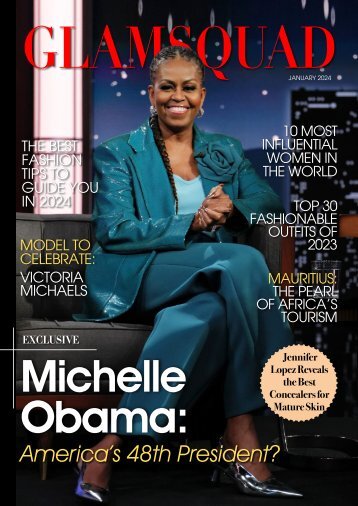
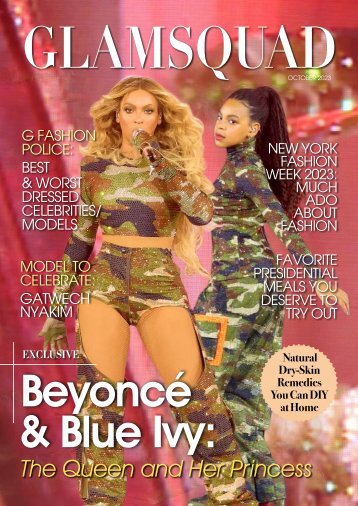




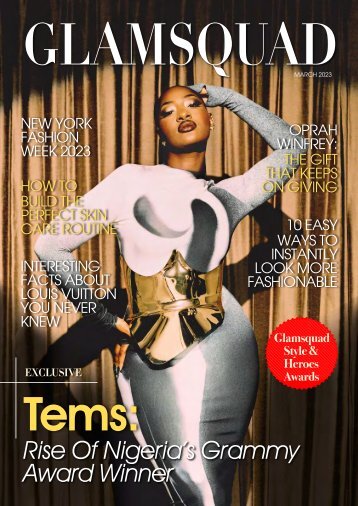

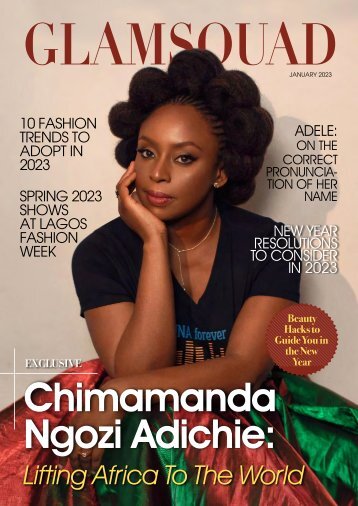

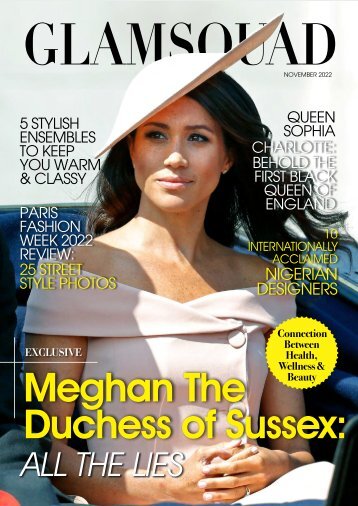


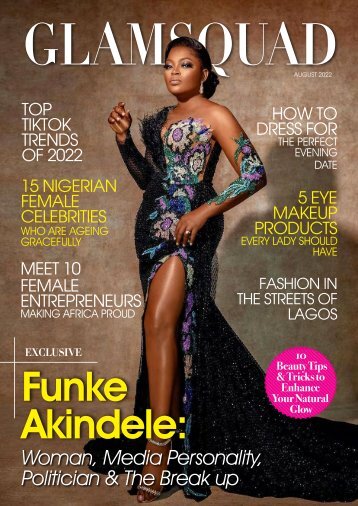
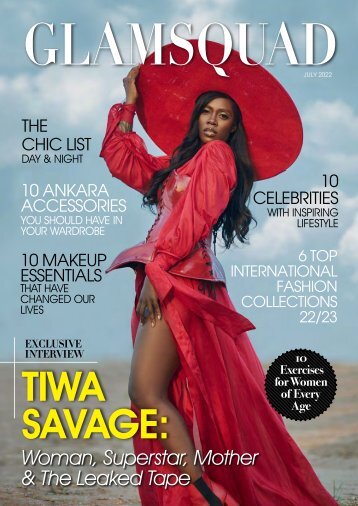


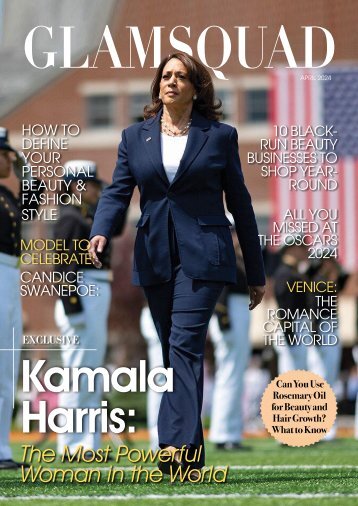



















Connect With Us